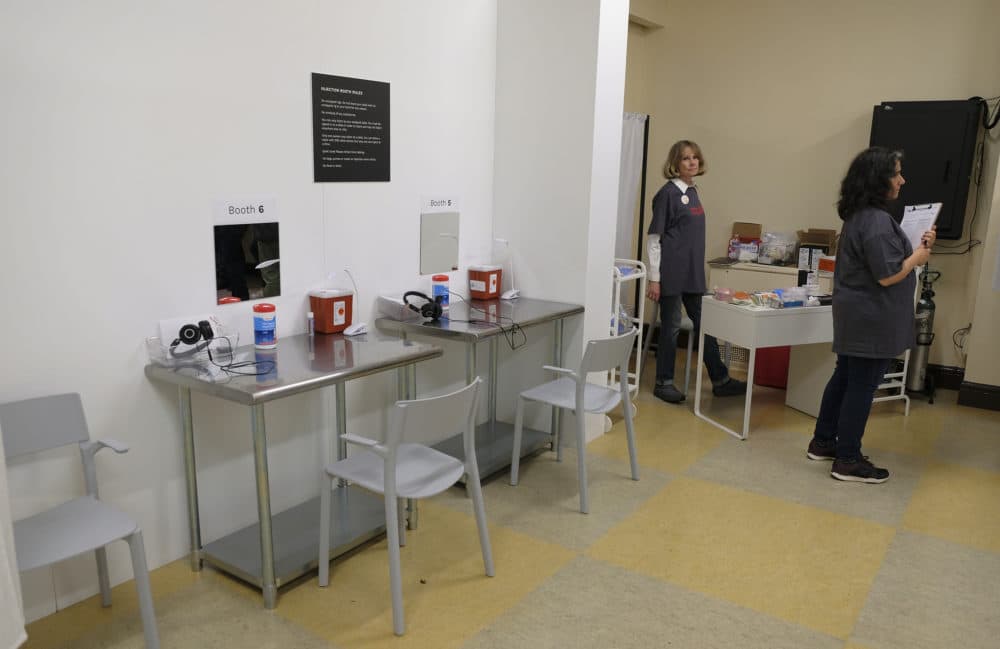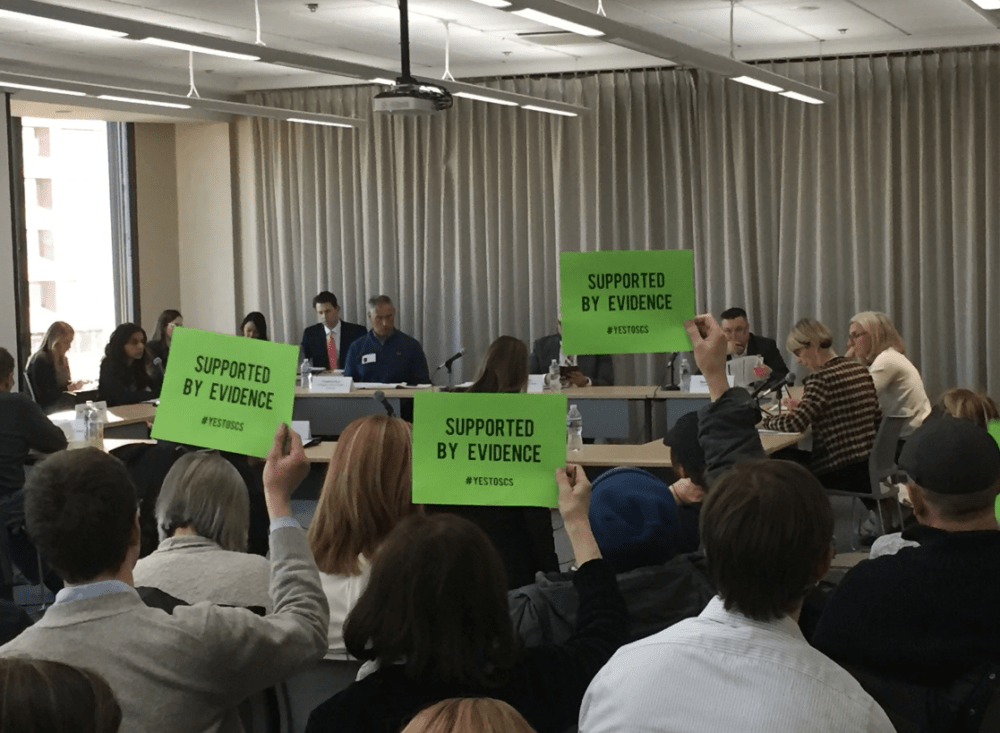Advertisement
Mass. Panel Recommends One Or More Supervised Consumption Sites To Reduce Opioid OD Deaths

Massachusetts should test the use of clinics where drug users can shoot up or inhale drugs, and be revived by medical staff if needed, because such clinics save lives. That's the gist of a recommendation to state lawmakers that will be included in a report due later this week.
That and other findings about ways to reduce deaths in the opioid epidemic come from a special commission that included current and former drug users, two mayors, doctors, law enforcement and legal experts, as well as state government appointees.
State Rep. Jeff Roy said he didn't support the highly controversial idea of supervised consumption sites when he joined the commission last year. But he told himself to keep an open mind. He visited a cluster of clinics and drop-in centers in the South End of Boston and walked sidewalks often packed with drug users.
"It brought home the humanity of what's involved in harm reduction," Roy said. "There are real people out there who need our compassion, and who need our commitment and who need our understanding."
Roy said research and testimony the commission collected will help persuade state lawmakers to allow one or more pilot supervised drug use sites. The main reason is that doing so would save lives. No one has died after an overdose in any such clinics in Canada, including one that has been open since 2003.
Many mothers, fathers and siblings who have lost someone during the opioid epidemic in Massachusetts are praising the commission's recommendation.
Susan McLean's son died three years ago. Her sister died last year. Both died alone. McLean, from Falmouth, said supervised consumption sites send the message that drug users don't have to hide.
"Addiction is a disease," McLean said. "Shaming, blaming and pushing people to the margins won't help. We need to bring [the disease] into the light, into the sunshine."

Others who work with people who use drugs have been concerned supervised consumption sites offer a respite that will make it easier to avoid treatment.
"I don't want anyone to overdose and die," said Cynthia Goldberg, who directs a re-entry program called the F8 Foundation. "Yet the most success is when I see a client say, 'I simply can't live like this anymore; I need help.' I'm not so sure they're going to ask for help in those sites."
Commission members stressed that treatment is not the primary goal of supervised consumption sites. Research shows the sites may be a path to treatment. But the goal of these places is to reverse an overdose, which with fentanyl, can shut down the respiratory system in less than a minute.
"It brought home the humanity of what's involved in harm reduction. There are real people out there who need our compassion, and who need our commitment and who need our understanding."
State Rep. Jeff Roy
If Massachusetts lawmakers agree to a trial run of this contentious strategy, the state would have to find money for the pilots, amend state drug laws and medical license rules and find a willing city or town.
The mayors of Boston, Cambridge and Somerville have said they support the concept. One of the main opponents may be Gov. Charlie Baker.
"I'd much rather focus on stuff that we can do and are doing rather than on something that the feds have made very clear they're not going to permit us to do," Baker said a few hours before the commission debated its recommendation.
Baker was referring to clear warnings from Massachusetts U.S. Attorney Andrew Lelling, who told WBUR in January that he would use federal civil law to block the opening of a supervised consumption site and criminal laws to prosecute the organizers and seize property.
"My constitutional role is to enforce federal law," Lelling said, adding he sees the supervised consumption approach as an acknowledgement of defeat. "I think it normalizes drug use, and I don't think we should be or need to be doing that."
Advertisement
"I'd much rather focus on stuff that we can do and are doing rather than on something that the feds have made very clear they're not going to permit us to do."
Gov. Charlie Baker
A spokeswoman confirmed the commission recommendation would not affect Lelling's position. The commission report, due by March 1, is expected to acknowledge warnings from Lelling and other Department of Justice officials, but label them opinions that have not been tested in courts.
And some law enforcement officials in Massachusetts disagree with Lelling.
"I think it's time for the federal government to step back and say, 'Let's let this go forward,' " said Northwestern District Attorney David Sullivan, who is based in Northampton. "If Massachusetts passes this legislation to enable pilots we have every right to take care of our citizens the way that we see fit."
Sullivan said he's persuaded that supervised consumption sites are a needed life preserver in the midst of the opioid crisis.
Some members of the Massachusetts congressional delegation agree.
"We should follow the science and adopt it where it has been proven to be effective," said U.S. Sen. Ed Markey, "not just here but across the country."
There's no indication federal law will be amended to accommodate supervised injection, and state legislative leaders have not made any predictions about the fate of bills that will build on the commission's recommendation.
Even if supervised consumption pilots are part of a package the Legislature passes, legislators suggest it would take two years to prepare a pilot.
State Sen. Cindy Friedman said many people aren't convinced that bringing illegal drug activity into a medical clinic is a legitimate way to fight drug use. Friedman supports the idea but said candidly that she still wrestles with it herself.
"I'm not necessarily comfortable with safe consumption sites, it doesn't exactly fit in with my repertoire," Friedman said after the commission meeting where she proposed the final language for the recommendation. "It isn't about me. It's about what is going to work to address this emergency."
The commission's report is expected to call for other tools to reduce the harm of the opioid epidemic in Massachusetts: more naloxone, more test strips to help drug users detect fentanyl, more recovery coaches and prevention programs. These and other tools are all also aimed at promoting more compassion for people who become addicted to drugs.
This article was originally published on February 26, 2019.
This segment aired on February 27, 2019.
